
“Do you remember how I used to give you trouble for borrowing my shoes?”
“Yes, when we wore the same size.” I could picture the shoes lined up near the door, slipping them on as I left for school. Because I could, because they fit. My father had impeccable taste, and a teenage boy didn’t think ahead to how a sudden scuffle or impromptu game might not return those finely crafted and costly shoes in the same condition. “I’ll bring you a new pair, something special, when I come to Delhi next. I can’t borrow your shoes anymore, my own feet have grown.”
“It’s not only your feet that have outgrown my shoes. You’ve outgrown me altogether.” There was a flush in his voice that carried down the phone line, all the way from Delhi to Cambridge. Now that my parents were aging, I made a point of calling regularly on weekends. Our conversations were usually light and casual, but on this particular beautiful fall morning my father went off on a sentimental tangent. “You’re thirty-two years old. When I was your age, I had just finished university and started teaching. But I had never even left Bihar. You’ve traveled the world. You’ve done so much good work that I really admire and appreciate. You have become a teacher to the world.”
The emotional tone was entirely familiar, his own effusive style, but I was stunned to be on the receiving end of this observation. Never would I have expected to hear that phrase, “a teacher to the world,” from his mouth. I stood in the kitchen, phone in hand and tears welling up. I was running late—we had been talking for half an hour—but I couldn’t bring myself to end the conversation.
It was one of the last times I talked with my father before he died. Neither of us were seeking closure in the sense that that term is used in the West. Neither of us had picked up the phone with an agenda. In recent years we had reached what felt like an understanding, though not acceptance, of each other’s position, and I didn’t hope for more than that. What happened between us on the phone that day was entirely unexpected, and yet it emerged as effortlessly and spontaneously as my encounters with teachers that I’ve described in this book.
We spend so much of our lives seeking others’ validation and permission for the choices and decisions we make. We long for those whose opinions we value to recognize us, to see our journey. But engaging with mystery, and the peculiar chemistry of how that manifests in human connection, is something that happens in its own time, on its own terms. That is a stark truth that we have no choice but to face. All we can do is be open and ready to embrace it when it comes.
I would like to think that this book is not just about me. I’m not different from countless other seekers in the past, and the future too, who have chosen to embrace the mystery that beckons them and to follow where it leads. I hope you will see some part of yourself mirrored in my story and I encourage you, with joyful enthusiasm, to embark on your own contemplative journey toward self-actualization.
I respectfully urge you who study the mystery, don’t pass your days and nights in vain.
—SEKITO KISEN